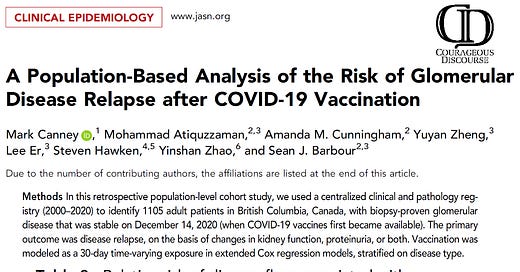Long-Term Organ Damage after COVID-19 Vaccines Emerging in Medical Literature
Progression of Glomerular Kidney Disease Reported with More Shots
By Peter A. McCullough, MD, MPH
Of all the great tension both doctors and patients have faced in the COVID-19 crisis is the lack of assurances on long-term safety of COVID-19 vaccines. Americans were told these genetic products were brought through testing at “warp speed.” While that may be wonderful for the Starship Enterprise, warp speed should not be viewed as favorable in drug or vaccine development. Observation time in research is very important to evaluate the emergence of problems, particularly for the long-lasting mRNA vaccines and their biologic product, the coronavirus Spike protein. For a typical live-attenuated, killed, or antigen-based vaccine, the minimum period for safety observation in clinical development is 2 years. For genetic products which includes mRNA and adenoviral DNA, the minimum time is 5 years. Now with mass indiscriminate vaccination, we have roughly two thirds of adult populations who have received a novel vaccine and the progression of their baseline medical problems is specific aim of research going forward at many centers. Canney et al studied 1105 patients who had stable glomerular kidney disease in 2020 before mRNA, and then followed them after receiving one or more of the COVID-19 vaccines.[i] Glomerular kidney disease can worsen to complete kidney failure and dialysis, so the consequences are significant if there is a problem with mRNA, Spike protein, and progression of disease. As shown in the table, for the double vaccinated, there was more than a two-fold increase in progression of kidney disease.
That means a loss of renal function which is usually permanent for the vaccinated. Using multivariable adjustment, this effect persisted. The inference is the worsening of kidney disease is attributable to the vaccine and none of the other traditional risk factors (high blood pressure etc). So if you or a loved one has kidney disease and was pressured into vaccination by a primary care physician or nephrologist, please share this Substack with them and suggest that they never again promote an experimental product without any long-term assurances on safety. Such a product should only be considered by the patient as one would in a research trial, purely on the basis of personal preference and willingness to be involved in a form of clinical investigation.
If you find “Courageous Discourse” enjoyable and useful to your endeavors, please subscribe as a paying or founder member to support our efforts in helping you engage in these discussions with family, friends, and your extended circles.
[i] Canney M, Atiquzzaman M, Cunningham AM, Zheng Y, Er L, Hawken S, Zhao Y, Barbour SJ. A Population-Based Analysis of the Risk of Glomerular Disease Relapse after COVID-19 Vaccination. J Am Soc Nephrol. 2022 Nov 4:ASN.2022030258. doi: 10.1681/ASN.2022030258. Epub ahead of print. PMID: 36332971.






Thank you for bringing what is very unpleasant information.
First of all, thank you so very much Dr. McCullough and Mr. Leake for all of these articles that raise such important points. I am particularly grateful that you provide the links to the articles you discuss, which have all been open source to date. I read every article you publish, and often read many of the supporting research articles, in order to best inform myself to share the truth with family and friends.
I have a question regarding this article. The authors' conclusions regarding their findings are resoundingly positive in favour of the vaccines over what they characterize as a "small" risk of relapse. Here is a quote that stood out to me:
"Despite this higher relative risk, the absolute increase in the risk of relapse remained low, and the majority of patients who experienced a vaccine-associated relapse did not require a change in immunosuppression. Our findings indicate that patients with glomerular disease should be monitored more closely after a second or third COVID-19 vaccine but that the established benefits of vaccination in this vulnerable population likely outweigh the small absolute increase in risk of disease relapse."
I have a PhD and a background in research in the Social Sciences but am not a medical doctor or researcher. I am unable to interpret the gap between the positive conclusions of the authors of the study and Dr. McCullough's concern about these findings. I am wondering if Dr. McCullough is able to explain this, if he has time? Thanks very much!